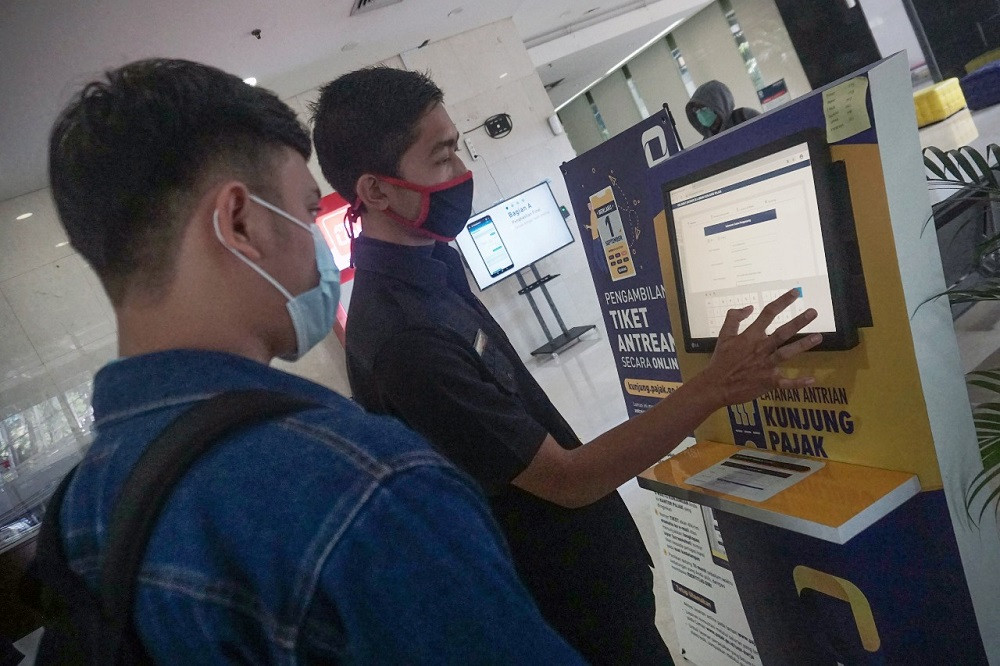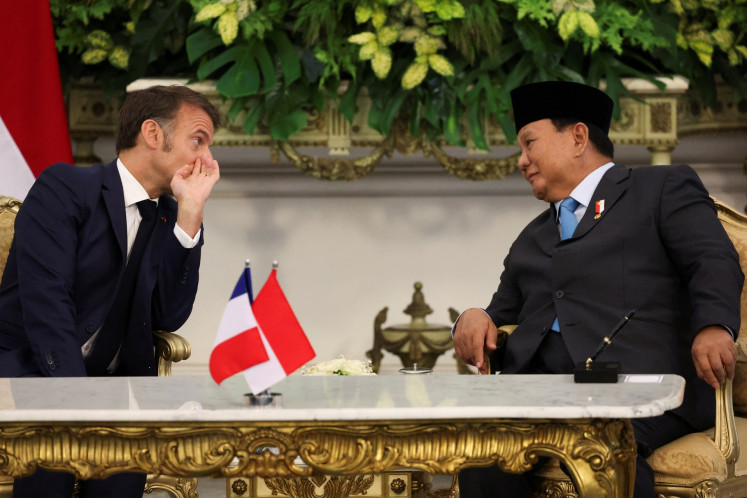The fiscal cost of the pandemic
Three top factors – political stability and security, regulatory and legal environment, market size – were cited by the majority of investors interviewed as critically important.
Change text size
Gift Premium Articles
to Anyone

T
he COVID-19 storms have claimed many victims, one of them is government tax revenue. As the economy contracted and the government has to provide tax relief, tax revenues fell 20 percent last year from 2019.
Meanwhile, the government had to increase its spending to protect the country from pandemics, to keep the economy from spiraling downward and to provide support for those impacted by the pandemic.
Even before the pandemic, government tax revenues had given the government a severe headache despite the various tax reforms.
Last year the tax ratio dropped to 8.3 percent of gross domestic product (GDP) from an average 10 percent before the pandemic. This was half of the ratio of other emerging economies such as Malaysia, Thailand, Vietnam (17-18 percent), Brazil (23 percent) and Turkey (17 percent).
Inevitably, the government debt and deficit rose to unprecedented levels. The deficit ballooned from Rp 353 trillion (US$25 billion) to Rp 956 trillion last year, and the government debt rose from Rp 4.77 quadrillion to Rp 6.07 quadrillion.
Before the pandemic, the interest cost for government debt averaged 8 percent of total expenditure. Last year the percentage rose to 12 percent. This year it could climb to 14 percent.
If this is not reversed through revenue-enhancing reforms, it will eventually crowd out priority spending such as infrastructure or risk jeopardizing Indonesia’s hard-earned investment-grade credit rating.
The government has been generous in providing tax incentives, and this is one reason why the growth of tax revenue is constrained. During the pandemic, government relief support for the corporate sector has been geared both toward liquidity support (temporary tax deferrals, tax cuts, tax exemptions) and solvency support (equity injections, tax relief) and mainly targeted at state-owned enterprises (SOEs) and small and medium enterprises. This year, this tax relief support would cost the government Rp 58 trillion in lost taxes.
In an effort to attract further investment, the government has decided to cut the corporate income tax rate from 28 to 22 percent in 2020 and to 20 percent in 2022. The question now is will this lower tax rate boost new investment needed to generate higher growth?
According to the Global Investment Competitiveness Report 2018, tax incentives as a variable influencing the decision to invest in a certain country rank below other variables. Three top factors – political stability and security, regulatory and legal environment, market size – were cited by the majority of investors interviewed as critically important.
Macroeconomic stability, a favorable exchange rate, availability of skilled labor and good infrastructure were cited as the next in importance. Tax incentives were ranked well below those variables in importance by investors surveyed.
Tax incentives impose a sizable fiscal cost, and this cost eventually should be compensated with higher revenue. Increasing excise duty for products that have a negative impact on health and environment, raising the income tax rate for top income earners and reducing subsidies are some options that are available for the government to increase revenue.
Indonesia is estimated to have the second-most plastic bag waste among 192 coastal countries in the world. Plastic waste, especially in marine environment, is of increasing concern because of its destructive effects on oceans, wildlife and humans. The government could impose a levy on plastic bags to address environmental issues as well as revenue shortfalls.
The government raised excise duty on tobacco products by an average 12.5 percent on Feb. 1 this year. Indonesia is the world second-biggest cigarette market after China, but its excise rate on tobacco is the lowest in the world. The excise increase should have been higher since it applies to only machine made cigarettes, where the employment effect is less than that for hand-rolled cigarettes.
Value-added tax (VAT) is another area that could be subject to reforms. According to the World Bank, the Indonesian VAT threshold is the highest in the world, and it proposed to lower it to expand the coverage. Last year, VAT fell 16 percent after falling 1 percent the previous year.
Now, the government apparently is in favor of adjusting the 10 percent VAT rate and is considering the implementation of multi-rate VAT, where a lower rate will be imposed on staple goods, while increasing the rate to 11-15 percent for tertiary products consumed by higher income groups. This policy should boost VAT revenue although it could risk higher prices and suppressing consumption.
One of the impacts of the pandemic is the widening inequality across income groups. While millions suffer income loss, a privileged few enjoy an enormous increase in their wealth. The owners of Djarum Group, Sinar Mas Group and Salim Group, together got richer by $4.2 billion (around Rp 60 trillion) last year and there are many other top-income groups who enjoyed large increases in their wealth.
Of course it is not fair if these people pay the same income tax rate as others with a lower income. Taxpayers have to bear a fair share of tax burden according to their wealth, and in this regard the government could increase the income tax rate for the top 1 percent of the population who hold 45 percent of household wealth.
Economic recovery will ultimately result in an increase in tax revenue, as demonstrated in the first quarter of this year, when tax revenue was up 3.8 percent from a stronger recovery. But there are still economic headwinds from the coronavirus spike in some neighboring countries and market volatilities that could slow down the pace of Indonesia’s economic recovery.
That’s why the government needs to be more aggressive in pursuing tax reforms even during the pandemic.
***
The writer is an economist and a commissioner of a publicly listed company.









